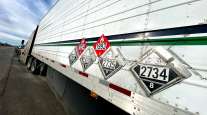PHMSA Denies Crude-by-Rail Rule Hazmat Petitions

The nation's hazardous material transportation regulator denied several administrative petitions from railroads, fuel and chemical manufacturers, tribes and others seeking changes in its crude-by-rail rule.
These groups, including the American Chemistry Council, urged the Pipeline and Hazardous Materials Safety Administration to alter parts of the rule (RIN 2137-AE91), ranging from thermal protection to braking requirements.
In its response, the federal regulator said that it “reasonably determined how to apply new regulations.”
“While we understand that shippers, carriers, and tank car manufacturers for Class 3 flammable liquids will face new challenges in the wake of these regulations, we maintain that they are capable of complying with the final rule,” PHMSA Administrator Marie Therese Dominguez said in the signed document.
The response, which was issued Nov. 5 and released Nov. 6, ends the administrative consideration of the rule and shifts the focus of those hoping to alter the rule to federal courts and Congress. The denial was issued before two trains carrying flammable liquids derailed in Wisconsin—one Nov. 7 and the other Nov. 8.
The rule itself requires that, to limit risks of derailments, large quantities of flammable liquids such as crude oil and ethanol being transported by rail must be moved in stronger tank cars, with other requirements including certain speed restrictions.
The hazmat office declined to reconsider:
• Narrowing the types of goods the rail rule applies to;
•Eliminating, further defining or delaying its sampling and testing program;
• Expanding reporting requirements related to retrofitting tank cars;
• Adding thermal protection requirements for tank cars;
• Adding information-sharing procedures;
• Altering brake requirements;
• Reassessing tribal impacts of the rule.
The American Chemistry Council, American Fuel & Petrochemical Manufacturers, Association of American Railroads and the Dangerous Goods Advisory Council each expressed in e-mails to Bloomberg BNA disappointment in the PHMSA decision.
The fuel manufacturers and the goods council said separately they were evaluating the agency's decision but didn't identify more specific next steps. The fuel manufacturers group said it hopes Congress will resolve its concern — namely that PHMSA expand its reporting requirements for retrofitting tank cars.
Columbia River Treaty Tribes didn't respond to Bloomberg BNA's e-mail requesting comment.
Several groups, including some that filed administrative petitions, are a part of ongoing litigation in the U.S. Court of Appeals for the D.C. Circuit.
Others have gone to Congress to get the rule changed, with some efforts focused on the upcoming multiyear reauthorization of hazardous materials and other surface transportation programs.
The House and Senate are preparing to conference on their bills. But even as efforts to identify the appropriate policy solution continue, additional flammable liquid train derailments are occurring, highlighting what many consider an urgent safety issue.
On Nov. 7, 25 train cars derailed from a BNSF Railway train near Alma, Wisconsin. Nine of those cars ended up at least partially in the Mississippi River, and five of those leaked ethanol into the river totaling up to 20,000 gallons, BNSF told Bloomberg BNA. The railroad said it hasn't identified any environmental impacts from the spill so far.
On Nov. 8, 13 tank cars carrying Bakken crude oil derailed from a Canadian Pacific Railway train near Watertown, Wisconsin. One of those tank cars leaked up to 500 gallons of crude oil, and as of midday Nov. 9, more than 30 families still were evacuated, Canadian Pacific told Bloomberg BNA. Environmental impacts are being monitored, and no air monitoring readings have identified unsafe conditions, the railway said.
The Federal Railroad Administration is investigating both incidents, a Transportation Department spokesman told Bloomberg BNA.


